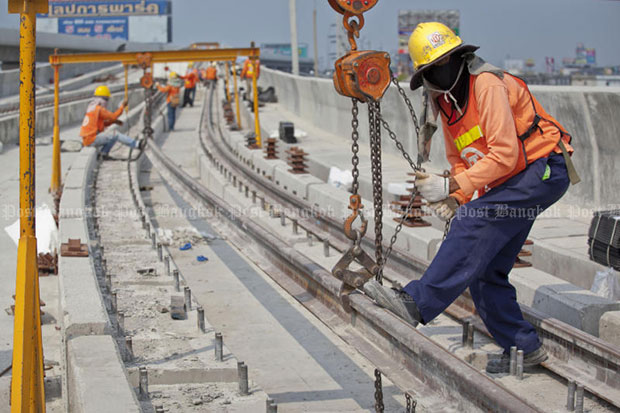
The government hopes to ease its public debt burden by luring the private sector to invest more in multibillion-baht infrastructure projects, especially in telecommunications and transport, through public-private partnerships (PPPs).
The Transport Ministry and the State Enterprise Policy Office have been instructed to discuss raising the limit for PPPs in infrastructure development, said Theeraj Athanavanich, deputy director-general of the Public Debt Management Office (PDMO).
Private-sector investment in infrastructure projects through PPPs is limited to 500 billion baht a sector, meaning the government budget is the main source of funding for capital-intensive projects in the telecommunications and transport sectors.
PPPs could be used as an investment channel for procurement in State Railway of Thailand projects, with the private sector buying rolling stock and hiring the SRT to run the train service, Mr Theeraj said.
The private sector may also be approached to invest in the SRT's Red Line linking Bang Sue and Rangsit.
Mr Theeraj said the cabinet wanted the PDMO to revise its forecast for public debt-to-GDP ratio to reflect future public debt levels better, although its estimated ratio of less than 50% remains well below the Finance Ministry's 60% threshold. Estimates by the debt management agency are based on the worst-case scenario.
The PDMO recently said the ratio was expected to peak at 53% in 2019, assuming the government's infrastructure investments and borrowings amounted to 300-400 billion baht a year, then edge down to 52% in 2020 after most of the infrastructure budget was taken out. Thailand's public debt as of July 31 amounted to 5.72 trillion baht or 42.9% of GDP.
The government's infrastructure development plan sees 1.9 trillion baht going to megaprojects (aside from water management) in the eight years through 2022.
Apart from PPPs, tax reform to boost revenue could also ease the government's debt burden, Mr Theeraj said.
Borrowing to offset the budget deficit is the major contributor to the government's higher debt, while borrowing for investments averages 100 billion baht a year.
The government borrowed 250 billion baht to finance the 2015 budget deficit and plans to borrow 390 billion for the deficit next fiscal year starting Oct 1. Borrowing to finance the budget deficit is estimated at 300 billion baht a year over the next five years.
For fiscal 2016, the PDMO plans to borrow 563 billion baht including for construction of motorways such as Bang Yai-Kanchanaburi at a cost of 10 billion and Bang Pa-in-Saraburi-Nakhon Ratchasima worth 11.6 billion.
Of the 80-billion-baht short-term stimulus package for water management and roads, procurement contracts worth 50 billion have been signed, Mr Theeraj added.